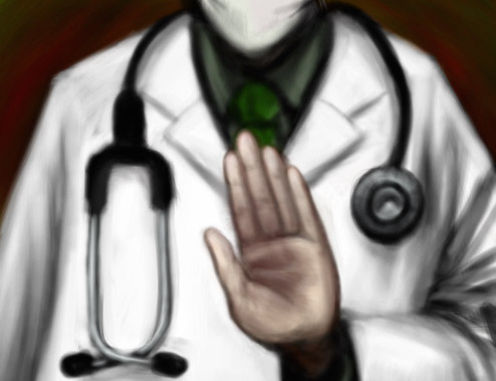
Many doctors will recall as a student or trainee hanging nervously off the end of a Deaver – a large retractor used in pre-keyhole gall bladder surgery – while simultaneously trying to answer the surgeon’s barked questions about the anatomy in the cavity. The problem is you can’t actually see into the cavity without loosening your grip. A looser grip means less vision for the surgeon and usually a torrent of abuse for the trainee.
Such moments of “teaching by humiliation” during medical training underscore the nature of medical culture: a totem pole that places surgeons very much at the top. Indeed, doctors have long enjoyed both enormous autonomy and deference to their apparent god-like power to stave off death.
Within this mythology, medicine has built a hierarchical and autocratic workplace culture in which incivility, and even frank bullying, towards subordinates is commonplace. Medical students gradually acculturate to this during their training, often at the cost of their empathy and compassion.
A recent meta-analysis of 51 studies on harassment and discrimination in medical training showed 59.4% of medical trainees had experienced at least one form of these. “Teaching by humiliation” – regarded by some as a kind of necessary hardening experience – was experienced by 74% of students and witnessed by 84%. Many still felt the sting decades later.
Such power-oriented, stratified workplaces are good for no one. And, in medicine, many of the worst consequences fall on patients.
Harm to patients
Australians are 40 times more likely to die from errors in health care than from traffic; such “iatrogenic” errors costs medicine more than A$2 billion each year.
Poor communication resulting from uncivil medical hierarchies can be deadly. Mistakes caused by poor communication are particularly frequent in surgical teams. Similarly, doctors are both the least compliant with hand hygiene protocols and the most resistant to hygiene audits and surveillance despite high rates of hospital-acquired infection, including serious infections such as multi-drug resistant staphylococcus aureus, which may result in limb amputation.
Besides clinical errors, patients are also often deeply hurt by, and frequently litigious about, the absence of good, empathic communication. How can we expect young doctors and nurses to offer this, when the reverse is daily modelled by their clinical seniors towards their colleagues and patients?
As with many severely hierarchical cultures, disproportionate discrimination is experienced by women. In Australia, surgery has the lowest representation of women at around 8.8%, although typically about 50% of medical students are female.

Suicide, mental illness, and substance abuse are all significantly more common among medical students and doctors than the general population, as the deaths of four junior doctors only a month ago tragically demonstrated.
And women are much more likely to be affected than men. This week, Dr Gabrielle McMullin and several other female surgeons spoke boldly of entrenched sexual harassment and bullying in surgery, and of the likelihood of punitive treatment for anyone who complains about it.
Cultivating humility
But there is reason to be optimistic; health care is changing. Inter-disciplinary teams are becoming the new work paradigm, flattening traditional hierarchies. Patients demand more say in their care, and are more likely to hold doctors to account when things go wrong. Hospitals actively cultivate integrated and positive relationships with local communities. And workplace health and safety and practice accreditation processes are reducing risk.
Still, cultural change is slow and painful. When we teach medical students to work with the increasing diversity among their patients and colleagues, we encourage a “cultural humility” approach. This requires them to be aware of their own identity and privilege, to respect and be sensitive to the identities of others and to be humble enough to admit they don’t know all there is to know, but be willing to learn.
Humility and autonomy are not easy bedfellows: knowledge and the ability to act on it quickly are core to what doctors do and fundamental to their professional identities. But increasingly, doctors are recognising that the two are not mutually exclusive. Indeed, not having to be all-knowing, and being allowed to be vulnerable even, makes their jobs more satisfying and sustainable.
As is the case in that other very hierarchical and masculine workforce, the military, there are encouraging signs of change. Yesterday, the president of the Royal Australasian College of Surgeons, Professor Michael Grigg announced he was getting a group of high-profile experts to:
examine its culture and concerns that bullying and harassment are rife within Australian hospitals.
The move came after Victorian Health Minister Jill Hennessy said she would ask the Auditor-General to look into bullying and harassment in Victoria’s hospitals as well as current complaint processes. The inquiry would be either an extension of a current inquiry into violence against health-care workers from patients and visitors, or a new one.
Some doctors will struggle to adapt to a less deferential society in which they are expected to be humble and human team-players who are still able to shoulder god-like responsibility at key moments. Indeed, there’s an important conversation to be had about the many outdated and unrealistic expectations of doctors within both the community and the profession.
As the woman whose case started it all, Dr Caroline Tan said yesterday, the “boys’ club” may not like it, but “it’s going to be for the better”.
Kimberley Ivory receives funding from Harold and Gwynneth Harris Endowment for the Medical Humanities.
Claire Hooker does not work for, consult to, own shares in or receive funding from any company or organisation that would benefit from this article, and has no relevant affiliations.
